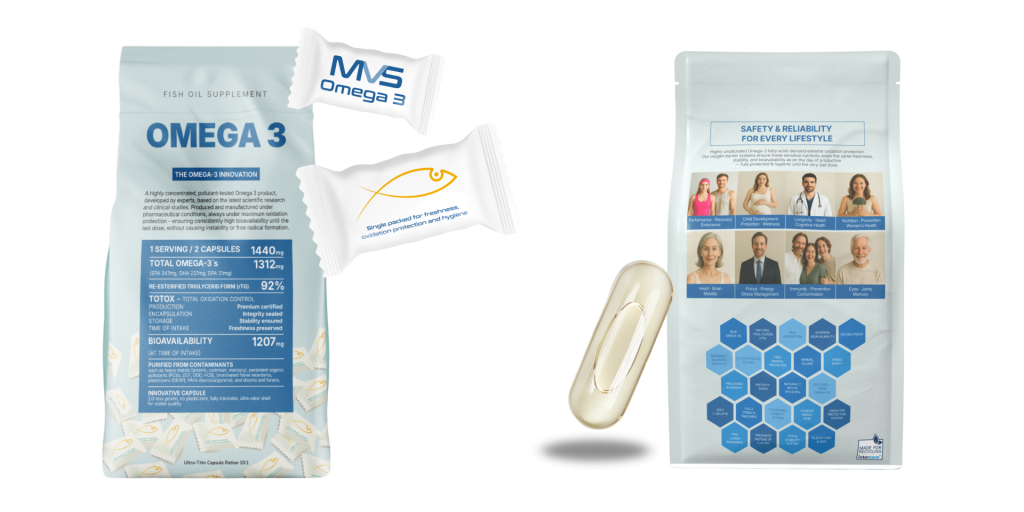Table of Contents
Understanding Psoriasis — More Than a Skin Condition
Psoriasis is a chronic, immune-mediated skin disorder that affects around 2–3% of the global population. Characterized by red, scaly plaques that often appear on the elbows, knees, scalp, or lower back, psoriasis extends beyond the surface of the skin. It represents a systemic inflammatory disease involving the immune system, metabolic health, and even cardiovascular function.
While modern dermatology has developed effective immunosuppressive and biologic therapies, many patients continue to seek natural, long-term strategies to manage inflammation and improve skin barrier health. Among these, Omega-3 fatty acids have emerged as one of the most evidence-supported nutritional adjuncts for psoriasis management.
Recent clinical research and biochemical studies have shown that Omega-3 fatty acids — especially those of the EPA (eicosapentaenoic acid) and DHA (docosahexaenoic acid) types — can modulate key inflammatory pathways involved in psoriasis, improving both skin symptoms and systemic inflammation markers.
What Are Omega-3 Fatty Acids and Why They Matter
Omega-3s are essential polyunsaturated fatty acids that the body cannot produce on its own. They are vital components of cell membranes and precursors to lipid mediators that regulate inflammation and immune balance.
There are three main types:
- ALA (α-linolenic acid) – found in flaxseed, chia, and walnuts.
- EPA (eicosapentaenoic acid) – primarily found in marine oils such as salmon, mackerel, sardines, and anchovies.
- DHA (docosahexaenoic acid) – primarily found in marine oils such as salmon, mackerel, sardines, and anchovies.
EPA and DHA are the biologically active forms responsible for the anti-inflammatory, immunomodulatory, and skin-protective effects relevant to psoriasis.
However, not all Omega-3 supplements are created equal. The form, purity, and oxidation stability of the oil determine whether the body can absorb and effectively utilize these fatty acids — and whether they deliver the intended clinical benefits.
The Science Behind Omega-3 and Psoriasis: Omega-3 Psoriasis Benefits
- Inflammation Reduction at the Source:
- Psoriasis is driven by chronic inflammation, characterized by elevated cytokines such as TNF-α, IL-6, IL-17, and IL-23. These signaling molecules accelerate the production of new skin cells and lead to redness and scaling.
- EPA and DHA act as precursors to specialized pro-resolving mediators (SPMs), including resolvins and protectins, which actively help the body resolve inflammation rather than simply suppress it. They also compete with arachidonic acid, reducing the formation of pro-inflammatory prostaglandins and leukotrienes.
- Clinical studies published between 2023–2025 confirm that regular supplementation with high-purity Omega-3s leads to measurable reductions in inflammatory cytokines, translating into improvements in PASI (Psoriasis Area and Severity Index) scores and overall skin comfort.
- Immune System Modulation:
- Psoriasis involves an overactivation of T-helper 1 and T-helper 17 cells. These immune cells produce cytokines that perpetuate inflammation and keratinocyte overproduction.
- Omega-3 fatty acids exert immunomodulatory effects by influencing the membrane composition of immune cells, thereby changing how they communicate. This helps rebalance immune signaling, reducing excessive immune activation without suppressing the body’s natural defenses.
- Emerging 2024 immunology reviews highlight that long-chain Omega-3s can restore immune homeostasis in autoimmune conditions — including psoriasis, rheumatoid arthritis, and lupus.
- Supporting Skin Barrier Integrity:
- In psoriasis, the outer layer of the skin (the stratum corneum) loses its normal lipid balance, leading to dryness, cracking, and vulnerability to external irritants.
- EPA and DHA help rebuild the skin’s lipid matrix, promoting better hydration and reducing transepidermal water loss. Omega-3s also support the formation of ceramides — key lipids that strengthen the skin barrier and improve elasticity.
- Recent dermatological trials have found that Omega-3 supplementation enhances skin hydration and elasticity, while visibly improving scaling and redness within 8–12 weeks.
- Reducing Itch and Discomfort:
- One of the most distressing symptoms of psoriasis is persistent itching. By reducing inflammatory mediators such as leukotriene B4 (LTB4), Omega-3 fatty acids can significantly reduce pruritus intensity and improve overall comfort. Patients also report better sleep quality and less irritation after consistent intake of bioavailable Omega-3s.
Omega-3 Psoriasis Benefits: Key Insights Summary
Recent research shows that Omega-3 fatty acids (EPA and DHA) help reduce psoriasis symptoms by targeting the root cause — chronic inflammation. They modulate immune responses, lower pro-inflammatory cytokines, and strengthen the skin barrier, leading to visibly calmer, more hydrated, and less scaly skin over time.
Clinical Evidence: Omega-3 and Psoriasis in 2024–2025
Several peer-reviewed studies have reinforced the potential of Omega-3s in aiding psoriasis:
- A 2024 meta-analysis in Frontiers in Immunology found that high-EPA supplementation (≥2 g/day) reduced PASI scores by 22–35% in moderate psoriasis cases after 12 weeks.
- A 2025 European Dermatology Journal study observed that patients taking rTG-form Omega-3 showed better improvements in skin hydration and scaling compared to those taking ethyl ester forms.
- An ongoing multicenter trial (2025) is exploring Omega-3’s synergistic effects when combined with biologic therapies, with preliminary data suggesting faster response and reduced flare frequency.
How to Integrate Omega-3 Into Psoriasis Management
- Consult a Specialist: Always discuss supplementation with your dermatologist or healthcare professional, especially if you are taking other medications or biologics.
- Optimal Dosage: For general wellness, 500–1,000 mg of combined EPA and DHA per day is typical. For psoriasis and inflammatory conditions, higher therapeutic doses — 1,500 to 3,000 mg/day — are often used under medical supervision.
- Choose Proven Quality: Select supplements with verified rTG form, low TOTOX values, and oxidation protection measures. MVS Omega-3 provides one of the highest purity concentrations (92%) available globally, backed by rigorous quality measures and transparency, and it’s externally tested for contaminants.
- Combine with an Anti-Inflammatory Diet: Enhance results by following an anti-inflammatory diet rich in whole foods, vegetables, omega-3-rich fish, olive oil, and minimal processed fats or sugars.
- Consistency is Key: Benefits build gradually. Studies show significant improvement after 8–12 weeks of continuous use, with sustained skin and inflammatory balance over time.
Why Purity and Oxidation Protection Define Effectiveness
While many Omega-3 products promise benefits, oxidation is the single biggest factor determining whether these benefits reach the body at all. Once Omega-3 oils oxidize, they not only lose efficacy — they can also produce harmful byproducts that increase oxidative stress.
At MVS Pharma, we believe people deserve the best option for their health. That’s why we decided to create it for them: Our MVS Omega-3 directly addresses oxidation, the industry’s biggest weakness.
This ensures Omega-3s remain fresh, stable, and effective from production to consumption — no shortcuts, no compromises.
The scientific consensus is clear:
The efficacy of Omega-3 therapy is directly proportional to the freshness, form, and stability of the oil used.
MVS Omega-3 — Setting a New Standard in Purity, Stability, and Bioavailability
Developed by MVS Pharma’s medical and pharmaceutical experts, MVS Omega-3 represents a new generation of scientifically designed Omega-3 supplements. With a 92% natural rTG structure, verified bioavailability of 1207 mg, and our proprietary T-TOX™ oxidation control system, it ensures exceptional purity, stability, and absorption. Each batch meets European Pharmacopeia standards and is tested for over 20 potential contaminants — setting a benchmark for transparency and trust in modern nutritional science.

Not all Omega-3 supplements are created equal. The more unsaturated and effective Omega-3 molecules become, the more sensitive they are to air exposure — making oxidation protection the single most critical factor for preserving both safety and bioavailability. Once oxidation begins, oil turns rancid, loses efficacy, and may even generate free radicals.
At MVS Pharma, this challenge defined our mission. We engineered MVS Omega-3 as a next-generation formulation designed for uncompromised purity, verified stability, and maximum biological usability.
Key Facts:
- 90% Purified Omega-3 Concentration — delivering 1440 mg total oil with 1312 mg active Omega-3s (EPA 784 mg, DHA 518 mg) per serving.
- 92% Re-esterified Triglyceride (rTG) Form — structurally identical to natural fish oil for superior absorption (1207 mg bioavailable) and full physiological compatibility.
- T-TOX™ Total Oxidation Control System — exclusive German oxidation-management technology ensuring freshness and molecular integrity from production to the last capsule.
- Dual-Layer Packaging Protection — prevents oxidation, preserves hygiene, and guarantees stability throughout the product’s entire lifecycle.
- Ultra Thin Capsule Release 3.0™ — 2/3 less gelatin, no plasticizers, and >91% active ingredient load for transparency, purity, and optimized payload.
- Natural Tocopherol Matrix (α, β, γ, δ) — balanced antioxidant system calibrated to protect high-purity oil without destabilization.
- Pharma-Standard Purification & Testing — each batch is verified to meet European Pharmacopeia standards and is screened for over 20 contaminants, including heavy metals, PCBs, dioxins, PAHs, and plasticizers.
The result is an ultra-pure, oxidation-protected Omega-3 supplement that maintains its natural structure, freshness, and full efficacy until the final dose — ensuring consistent support for cardiovascular, cognitive, visual, and immune health.
Beyond Psoriasis: Systemic Benefits of High-Quality Omega-3
Psoriasis is increasingly recognized as a systemic inflammatory condition linked to higher risks of cardiovascular disease, metabolic syndrome, and depression. By reducing systemic inflammation, Omega-3s may lower these associated risks, offering broader health protection.
High-quality, oxidation-protected Omega-3 supplements also support:
- Cardiovascular health (improved lipid profiles and reduced triglycerides)
- Cognitive and mental well-being
- Eye health and visual performance
- Joint flexibility and reduced inflammatory pain
Conclusion: Freshness, Purity, and Protection — The Future of Omega-3 in Psoriasis Care
Omega-3 fatty acids represent one of the most powerful natural allies in managing psoriasis — a safe, well-tolerated, and science-backed approach to reducing inflammation, balancing immune function, and strengthening the skin barrier.
For individuals living with psoriasis, this means more than just skin improvement — it means renewed comfort, restored confidence, and a healthier inflammatory balance from within.
However, only oxidation-protected, highly bioavailable Omega-3s can deliver these results consistently. With its 92% rTG form, pharmaceutical-level purity, and total oxidation protection, MVS Omega-3 stands at the forefront of next-generation supplementation — offering a pure, safe option for those searching for the best fish oil supplement for themselves and their family.
Disclaimer: As a service to our readers, MVS Pharma GmbH publishing provides access to our library of archived content in our blog. Please note the date of the last review or update on all articles. No content on this site should ever be used as a substitute for direct medical advice from your doctor or other qualified clinician.
FAQs
-
How does Omega-3 help with psoriasis?
Omega-3 fatty acids, especially EPA and DHA, reduce inflammation by regulating cytokines such as TNF-α and IL-17 — key drivers in psoriasis. They also help balance immune activity, calm skin redness, and improve overall barrier function, supporting clearer, more comfortable skin from within.
-
Can Omega-3 supplements reduce psoriasis flare-ups?
Yes. Studies have shown that consistent intake of high-quality Omega-3s can decrease flare frequency and reduce disease severity. By lowering systemic inflammation, Omega-3s may help extend remission periods and support better long-term skin health.
-
Which form of Omega-3 is most effective for psoriasis?
The most effective form is re-triglyceride (rTG) Omega-3, which mimics the structure found in nature and offers superior absorption and stability.
-
How long does it take to see results from Omega-3 supplementation?
Most individuals begin noticing improvements in skin hydration, scaling, and irritation within 8–12 weeks of daily supplementation. Because Omega-3s act at the cellular level, consistency is key — results strengthen over time as inflammation and lipid balance normalize.
-
Can Omega-3 replace psoriasis medication?
No, Omega-3 supplements are not a replacement for prescribed treatments. However, they can serve as a safe, evidence-based adjunct therapy that complements dermatological medications and enhances overall outcomes. Always consult your dermatologist before making changes to your treatment plan.
-
What makes MVS Omega-3 different?
It offers oxidation resistance, superior absorption in rTG form, full safety testing, and double protection packaging — ensuring purity and potency from production to consumption.
Sources:
- National Library of Medicine: “Effects of fish oil supplement on psoriasis: a meta-analysis of randomized controlled trials”
- National Library of Medicine: “Study on the use of omega-3 fatty acids as a therapeutic supplement in treatment of psoriasis”


